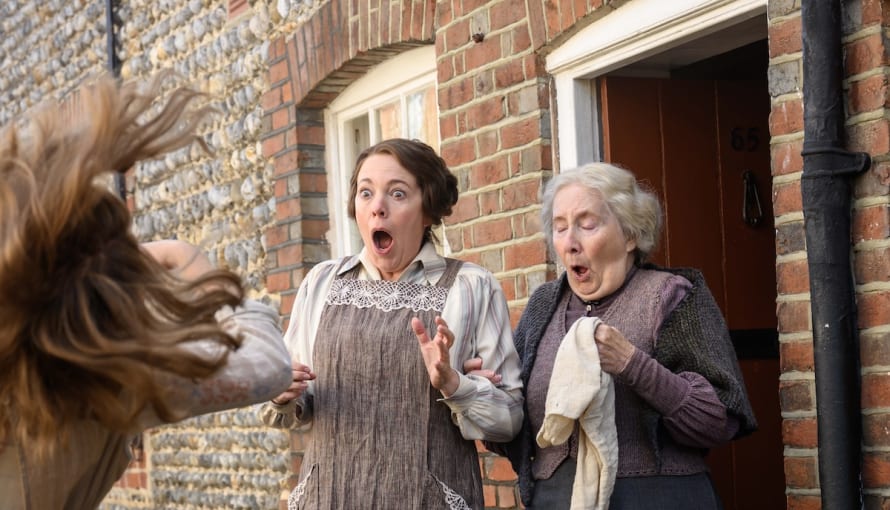An old-fashioned charmer with a modern twist, Thea Sharrock's Wicked Little Letters misses a valuable opportunity to be relevant. Leaning too heavily into its whimsical tone to take full advantage of its inherently disturbing aspects, Sharrock instead conjures Wes Anderson lite and offers up an entertaining vision that's not thought-provoking enough for current audiences.
Based on a scandal that rocked an English seaside town in the 1920s, Wicked Little Letters tells the rather clichéd tale of Edith Swan (Olivia Colman), a pious local, and Rose Gooding (Jessie Buckley), a rowdy Irish immigrant, as embittered neighbours who find themselves at odds when the former starts receiving poison pen letters.
As the outsider and more liberated woman, both in speech and lifestyle, Rose becomes the prime suspect. The male police chief decides it's an open-and-shut case, while police officer Gladys Moss (a sadly under-utilized Anjana Vasan), a woman with no actual authority within the force, feels something's not right and initiates an investigation.
Because of the film's predominantly comedic tone, the premise convincingly captures the hysteria that spreads from Edith's home to the town, and eventually across the nation. The vulgarity of the letters causes hilarious commotion within the stifling atmosphere of Edith's household that includes her aged parents, Edward and Victoria (played with joyous repressed gusto by Timothy Spall and Gemma Jones).
Colman and Buckley are an absolute delight, each exposing contradictions evident within these individuals. The actors are obviously revelling in their roles, providing a more satisfying experience of these potentially two-dimensional characters. There's nothing nuanced here, but it's revealing nonetheless.
Colman's complex series of expressions and tonal inflections unearths the wickedness within Edith. At the same time, Buckley creates a sympathetic portrait of a woman confined by conjecture and circumstances. Her pained looks speak volumes even as she while spewing invective at everyone in her path.
With such a stacked cast of heavyweights, Sharrock wisely allows them free reign to gleefully chew through scenery, dialogue and everything their talented hearts desire. This is the film's strength, maximizing the comedic potential. Sharrock ensures that the camera captures every tick and gesture employed by this talented bunch, lovingly embracing actors within the frame.
The problem with Wicked Little Letters is that the story has serious overtones which the film coasts over in its enthusiasm to bring the laughs. With the constant downgrading of the women and their rights, whether it be in the home or on the police force, the film points at a biting statement about the historical subjugation of females but never fully asserts it.
Edith's father is a frightening bully, but the implications of his behaviour go largely unexplored. At the same time, police officer Moss fights the good fight to properly solve the mystery, even though her battle against the powers that be gets short shrift. As Moss, Vasan isn't given that much to do and so her story, which is actually the film's throughline, often feels like an aside.
Wicked Little Letters ends up being more of a romp than the penetrating insight into humanity's foibles that it wants to be, as the moral majority's hypocrisy is merely hinted at. This film is akin to an entertaining British television show — basically a nice way to spend an afternoon. These performances are certainly worth a viewer's time, but Wicked Little Letters would've been more interesting if it had just scratched below the surface.
